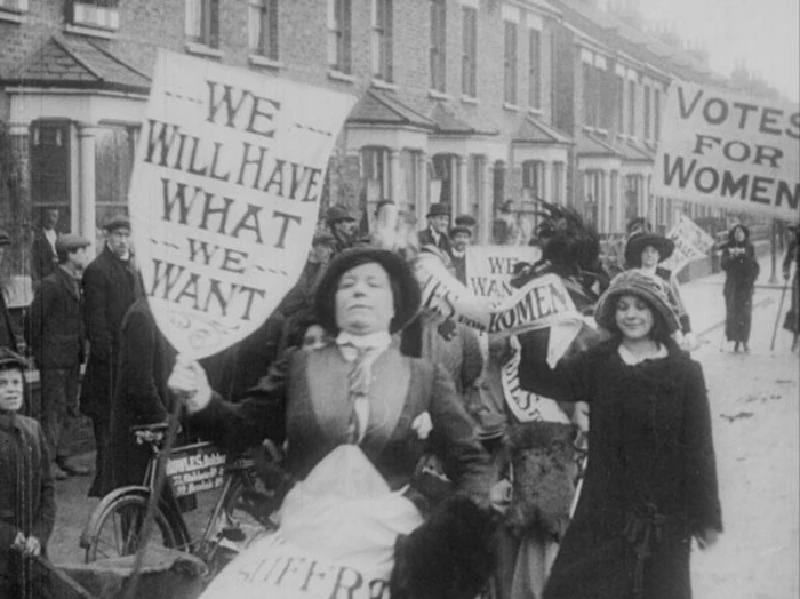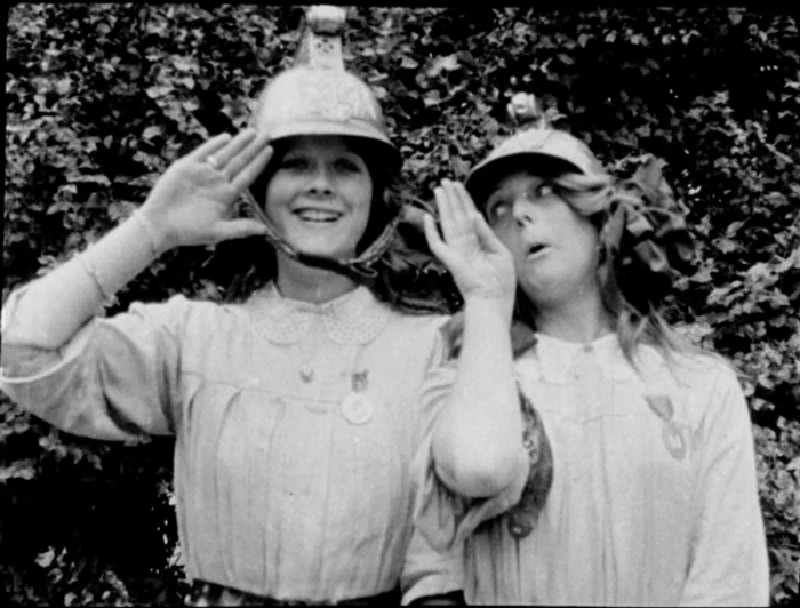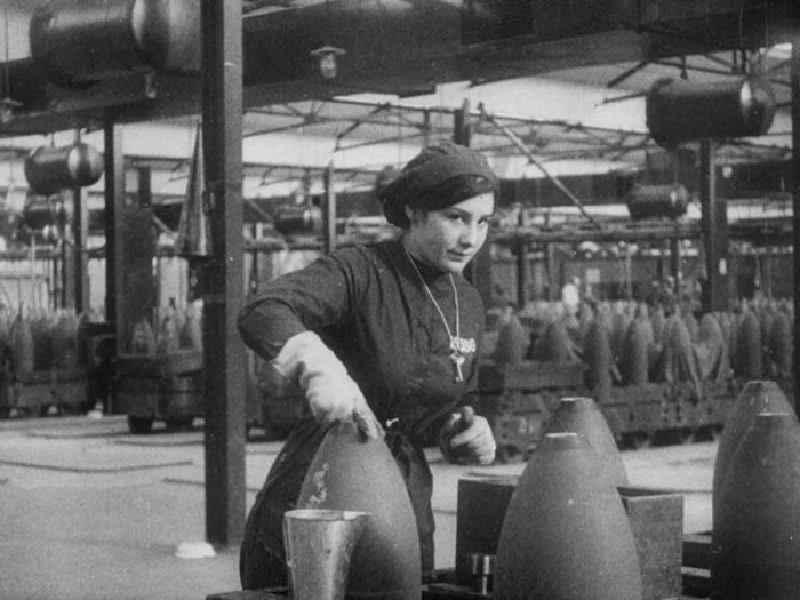Lillian Henley - Interview
by Owen Peters
published: 25 / 11 / 2015

intro
Owen Peters speaks to Lillian Henley, the composer of the soundtrack to a new documentary 'Make More Noise!', which compiles together silent film from the suffragette era
Open up a newspaper, magazine, take a trip to the cinema, switch on the radio or TV, and you’ll probably be met with the option to digest a slice of history relating to the suffragette movement. Interest has been rekindled due to the recent film 'Suffragettes' directed by Sarah Gavron and written by Abi Morgan. Although the film concentrates on events around 1910 to 1915, the suffragette movement began in 1897 when Millicent Fawcett founded the National Union of Women Suffrage. Emmeline Pankhurst subsequently set up the more powerful and politically motivated Women’s Social and Political Union in 1903. Suffrage means the right to vote, hence the reason it fitted so well into the movement's title. From the British Film Institute (BFI) National Archive comes 'Make More Noise! Suffragettes in Silent Film'. The title is taken from the rallying 'Freedom or Death' speech by Emmeline Pankhurst during November 1913. In order to get noticed by press and politicians she stated: “You have to make more noise than anyone else” The newsreel and documentary footage which make up 'Make More Noise' are curated with care and attention to detail by Bryony Dixon and Margaret Deriaz of the BFI. Whilst aspects of the suffragette movement are covered in the film, it’s the comedy reels pioneered primarily by the very funny Tilly Girls (Alma Taylor and Chrissie White) which confirm the role of women in society is about to change forever, whatever the cost. The BFI commissioned London based composer and pianist Lillian Henley to score 'Make More Noise'. It premiered at the BFI London Screen Festival in October, and was subsequently screened around the UK at selected cinemas. Henley played the film's score live in London, Belfast, Manchester, Bristol and Sheffield. Although I didn’t see any of the live performances, I did manage to catch the film at its Henley-on-Thames showing. We move from Henley-on-Thames to China, as Lillian Henley kindly fits in time to talk to me via Skype from Shanghai where she is performing 'Golam' with the 1927 Theatre Company. I begin by asking her reaction on feedback she has received to the film's score. “Overall it’s been very nice,” she says somewhat modestly. “It was incredibly exciting to play live and have instant audience reaction from the piece. This was my first commission on a silent film of this length(approximately 75 minutes), although I’ve been involved with silent film scores for five years or so.” Henley trained as an actor/performer, and studied 'Performance' (BA Honours) and 'Theatre Performance Practise' (Masters) at Northumberland University before moving into mainstream film and theatre projects. She has been with the 1927 company since its inception in 2006 until now working as Associate Artistic Composer. I suggest to Henley that the film isn’t so much about the suffragette movement but more on women's changing position in society at the turn of a new century. When linking the score to some of the comical, slapstick reels, Henley offers a more traditional music hall rendition. Trips, falls, flour over the head, and a dousing from a rogue water pipe are all there in the film. The likes of Buster Keaton and Laurel and Hardy come to mind as the audience watch with much guffawing. Henley, however, makes it very clear. This is humour with an important message. “Throughout the film footage elements are explored you wouldn’t associate with women at this time,” Henley says “The Tilly girls are very funny. Although it’s shown in a playful way they are challenging authority, generally sharing a carefree attitude to their feminine side. It highlights women want more from life than the domesticity endured by their mother and grandmother etc. The Tilly Girls are young women who are going against society's rules of the day. They are making subtle statement by humour. When told they can’t do something such as attending music lessons they rebel, running amuck causing mayhem. This type of non- conformity was unheard of. It was heralding a new phase for women. The subservient days of women were coming to an end.” 'Make More Noise' isn’t all about subtle statements. Henley tells me one of the biggest challenges when scoring the film were those scenes of Emily Davison being trampled by Amner, the horse of King George V, during the 1913 Derby. “The footage shows an incident has taken place, but continues to focus on the race. I decided to keep the score upbeat in line with images being captured by the camera. It was three days before Davison died from her injuries. So the press only reported the incident's tragic outcome many days later.” Footage of Davison’s funeral procession in Bloomsbury, London and burial in Morpeth, Northumberland is caught with respect and understanding by Henley’s score without turning it into a funeral dirge. We see thousands of mourners line the streets. Traffic comes to a halt. Women stride amongst the funeral procession with purpose and pride. Flowers tumble all around the hearse. This is a historically defining moment for women. Henley captures the scene and mood with maturity and an uncluttered musical simplicity. “Pacing and timing isn’t a pre requisite only for comedic acts on screen. Musical timing is key to a good score,” Henley says. “It’s about understanding the film's intentions and direction as a musician.” She learned the art with support and guidance from others along the way. “My style is intuitive. Whilst I draw on my training as a performer and actor, I’ve had very good support from numerous sources. Suzanne Andrade, the writer and director of 1927 , was great at giving me space to develop my composer’s voice. I was also fortunate to participate in a masterclass at Pordenone Silent Film Festival in the Italy Le Gionate del Cinema Muto in 2013. This monumentally changed the way I think when composing for silent film, I had the most inspiring silent film pianists as my mentors that week, Neil Brand, John Sweeney, Stephen Horne, Donald Sosin to name a few…" Throughout the film's score Henley works solely on piano. Was she tempted to introduce other instrumentation, such as strings? “It wasn’t really an option as we had a budget and timescale to work with. Before I saw the films I had ideas of playing around with a punky vibe, maybe adding a song or digital palette. Once I was faced with the film's footage I knew a single piano score was the right choice. Obviously I have thought how different sections would sound with, say, a string or brass section accompaniment, for example. But really it’s no more than a passing thought.” The diversity of tasks covered by women at the time is reflected in two of the longer film reels, which shows nurses working from a hospital in France during WW1 funded by the Women’s Union and women working in a Nottingham munitions factory. The munitions factory footage is breathtaking. The camera takes us through the process of workers making bombs. Henley’s melodic background would have you believe cakes are being made here, which adds to the naivety and tension of the situation. When other workers join in and the camera pans out to show the factory's size, those women are surrounded by hundreds and hundreds of bombs. Not a man in sight. A rather nervous set of giggles emanate from the cinema's audience at the scenes put before them. Due to the increased length of film footage involved with hospital and munitions scenes Henley becomes more expansive, capturing the broader canvas of events. She becomes playful at times then switching to a more classical style of interpretation as required. Gone is a score to cover death or humour. As the film's content changes, Henley allows the scenes to breath as we take in a variety of pictorial information. The film was already generating debate and discussion amongst the audience as we left the cinema. Did the film have a similar impact on Henley’s personal views, I ask ? “When I’ve spoken to people who have seen the film it generates discussion, debate and thoughts on the outstanding gaps we still have in women's equality. 'Make More Noise! Suffragettes in Silent Film' has made me question my identity as a woman and then as a female composer. This notion of gender and my work is something I’ve never really wanted to consider before. I’ve tried to forget gender has anything to do with my work, but I realise more and more it has everything to do with it. Its part of my voice, whether I like it or not. I’m realising it's okay to say I’m a feminist, and that I wholeheartedly believe in gender equality. If this film stimulates debate on women’s issues, that works for me” 'Make More Noise' is a wonderful collage of film footage chosen with care and sensitivity covering a varied historical subject matter which demands debate. Henley’s score adds focus to the themes adding detail and humour in all the right places. It’s also a stand alone composition. (That’s code for well worth a listen) Well done to the BFI, well done to Lillian Henley. I look forward to their next silent film project with anticipation. Whilst 'Make More Noise! Suffragettes in Silent Film' was only on a short cinema release. The DVD is available from November 23rd from all good entertainment retailers or by mail order from the BFI Shop Tel: 020 7815 1355 or online at www.bfi.org.uk/shop.
Band Links:-
http://lillianhenley.com/https://twitter.com/lillian_henley
Picture Gallery:-



most viewed articles
current edition
Carl Ewens - David Bowie 1964 to 1982 On Track: Every Album, Every SongBathers - Photoscapes 1
Colin Blunstone - Thalia Hall, Chicago, 16/7/2025
John McKay - Interview
Armory Show - Interview with Richard Jobson
Visor Fest - Valencia, Spain, 26/9/2025...27/9/2025
Billie Eilish - O2 Arena, London, 10/7/2025
Bathers - Photoscapes 2
Editorial - July 2025
Sir Tim Rice - Interview
previous editions
Heavenly - P.U.N.K. Girl EPOasis - Oasis, Earl's Court, London, 1995
Trudie Myerscough-Harris - Interview
Pixies - Ten Songs That Made Me Love...
Simon Heavisides - Destiny Stopped Screaming: The Life and Times of Adrian Borland
Beautiful South - Ten Songs That Made Me Love...
Prolapse - Interview
Boomtown Rats - Ten Songs That Made Me Love....
Blues and Gospel Train - Manchester, 7th May 1964
Donovan - Ten Songs That Made Me Love...
most viewed reviews
current edition
Amy Macdonald - Is This What You've Been Waiting For?Sick Man of Europe - The Sick Man of Europe
Alice Cooper - The Revenge of Alice Cooper
Phew, Erika Kobayashi,, Dieter Moebius - Radium Girls
Lucy Spraggan - Other Sides of the Moon
Blueboy - 2
Cynthia Erivo - I Forgive You
Davey Woodward - Mumbo in the Jumbo
Lapsley - I'm a Hurricane, I'm a Woman In Love
Philip Jeays - Victoria
Pennyblackmusic Regular Contributors
Adrian Janes
Amanda J. Window
Andrew Twambley
Anthony Dhanendran
Benjamin Howarth
Cila Warncke
Daniel Cressey
Darren Aston
Dastardly
Dave Goodwin
Denzil Watson
Dominic B. Simpson
Eoghan Lyng
Fiona Hutchings
Harry Sherriff
Helen Tipping
Jamie Rowland
John Clarkson
Julie Cruickshank
Kimberly Bright
Lisa Torem
Maarten Schiethart